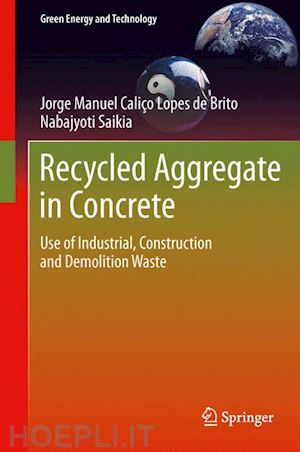
Questo prodotto usufruisce delle SPEDIZIONI GRATIS
selezionando l'opzione Corriere Veloce in fase di ordine.
Pagabile anche con Carta della cultura giovani e del merito, 18App Bonus Cultura e Carta del Docente
Concrete is the most used man-made material in the world since its invention. The widespread use of this material has led to continuous developments such as ultra-high strength concrete and self-compacting concrete. Recycled Aggregate in Concrete: Use of Industrial, Construction and Demolition Waste focuses on the recent development which the use of various types of recycled waste materials as aggregate in the production of various types of concrete.
By drawing together information and data from various fields and sources, Recycled Aggregate in Concrete: Use of Industrial, Construction and Demolition Waste provides full coverage of this subject. Divided into two parts, a compilation of varied literature data related to the use of various types of industrial waste as aggregates in concrete is followed by a discussion of the use of construction and demolition waste as aggregate in concrete. The properties of the aggregates and their effect on various concrete properties are presented, and the quantitative procedure to estimate the properties of concrete containing construction and demolition waste as aggregates is explained. Current codes and practices developed in various countries to use construction and demolition waste as aggregates in concrete and issues related to the sustainability of cement and concrete production are also discussed.
The comprehensive information presented in Recycled Aggregate in Concrete: Use of Industrial, Construction and Demolition Waste will be helpful to graduate students, researchers and concrete technologists. The collected data will also be an essential reference for practicing engineers who face problems concerning the use of these materials in concrete production.
Jorge de Brito is a Full Professor at the Civil Engineering, Architecture and Georesources Department of Instituto Superior Técnico, Technical University of Lisbon, Portugal. He was also the Head of the ICIST Research Unit in two consecutive terms between 2009 and 2012. One of his main research fields is the use of recycled aggregates in mortar and concrete production, within the Sustainable Construction general framework. He has co-authored several book chapters, around 40 ISI papers and many other publications on this specific field. His supervision experience comprises several Post-Doc scholarships, around 25 PhD’s and more than a 100 Masters. He has participated in 15 research programs (4 international), two of which as Principal investigator concerning the use of recycled aggregates in concrete. He is a member of the following international scientific commissions: W80 (CIB) / 100-TSL (RILEM); W86 (CIB); W115 (CIB). He is a frequent contributor to international journals both as an author (with 100 plus published papers) and as a reviewer (in 50 different journals).
Dr. Nabajyoti Saikia is working at Kaziranga University, Jorhat, (India). He obtained a Ph. D. degree in chemistry (material science) from Dibrugarh University (India) in 2003. His research interest includes the solid waste management, chemistry of cement and allied materials, environmental chemistry and concrete science. He has published more than 50 numbers of research articles in various refereed journals, conference proceedings and in book as a book-chapter.











Il sito utilizza cookie ed altri strumenti di tracciamento che raccolgono informazioni dal dispositivo dell’utente. Oltre ai cookie tecnici ed analitici aggregati, strettamente necessari per il funzionamento di questo sito web, previo consenso dell’utente possono essere installati cookie di profilazione e marketing e cookie dei social media. Cliccando su “Accetto tutti i cookie” saranno attivate tutte le categorie di cookie. Per accettare solo deterninate categorie di cookie, cliccare invece su “Impostazioni cookie”. Chiudendo il banner o continuando a navigare saranno installati solo cookie tecnici. Per maggiori dettagli, consultare la Cookie Policy.